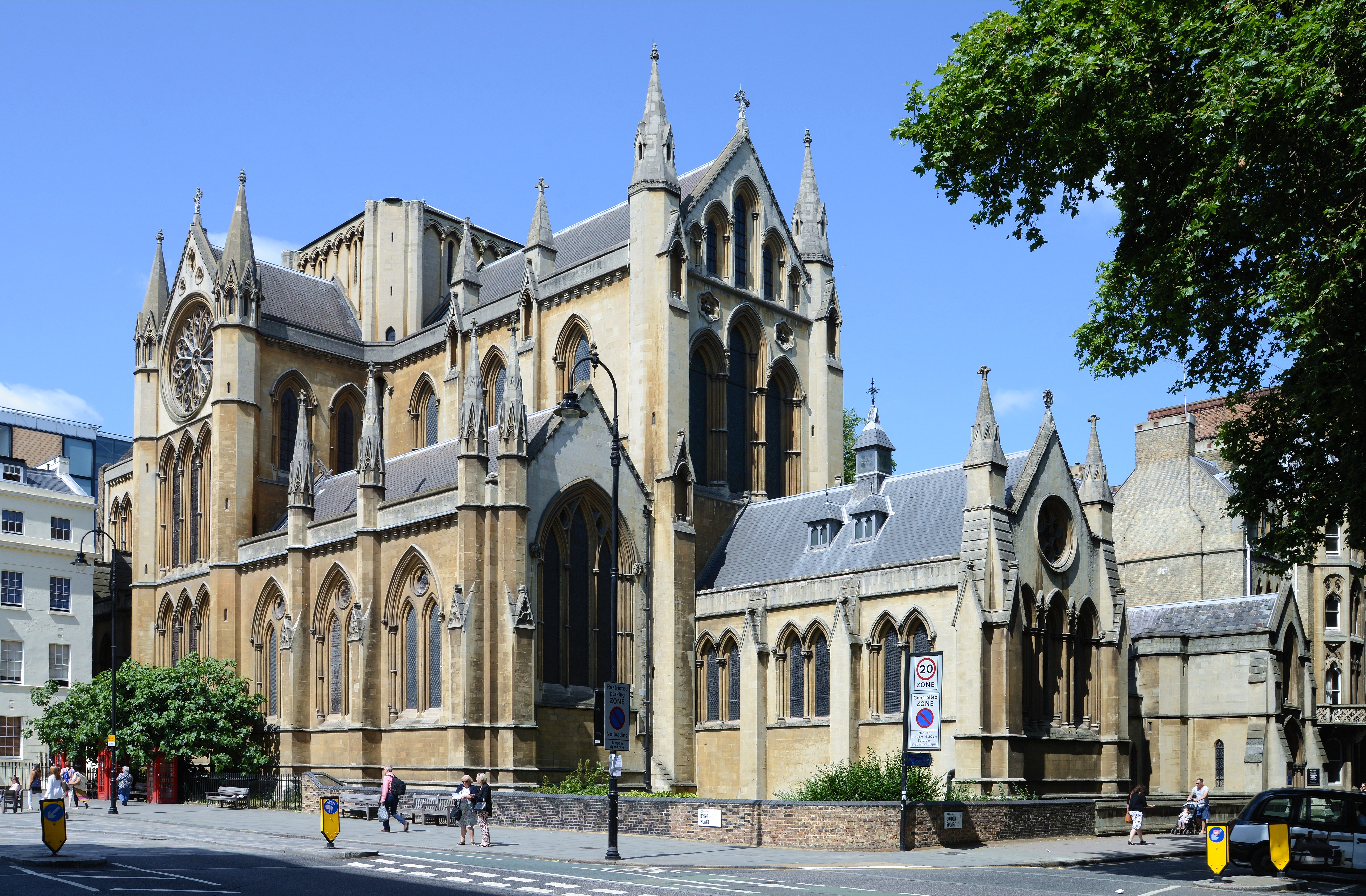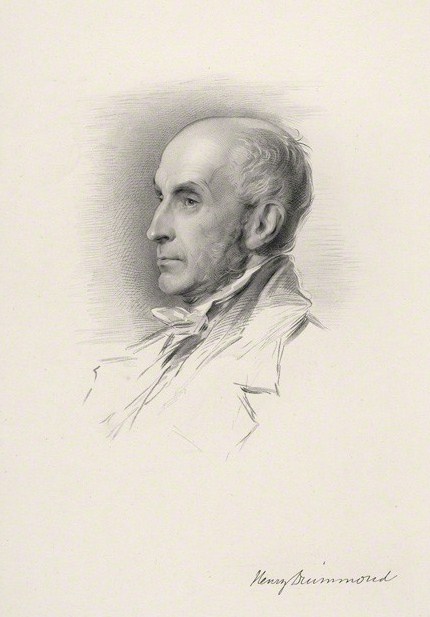|
The Record (Haldane)
Alexander Haldane (15 October 1800 – 19 July 1882) was a Scottish barrister and newspaper proprietor. He was known as a religious controversialist and evangelical of the Church of England. Early life He was the son of James Alexander Haldane and his first wife Mary Joass, and nephew of Robert Haldane. He studied at Edinburgh High School. He was then sent with his elder brother James in 1814 for a year to a private school at Winteringham in Lincolnshire, run by Lorenzo Grainger who was a curate there and an evangelical. Haldane returned to Scotland and the University of Edinburgh. The brothers were invited in 1819 by Thomas Babington to Rothley Temple. Alexander entered the Inner Temple in 1820, and was called to the bar in 1826. He acted as junior to Lord Brougham in an appeal case to the House of Lords. But he then concentrated on conveyancing work. Religious views As a young man, Haldane was involved with Henry Drummond (1786–1860) and the Albury circle around him. His ... [...More Info...] [...Related Items...] OR: [Wikipedia] [Google] [Baidu] |
Edinburgh
Edinburgh ( ; gd, Dùn Èideann ) is the capital city of Scotland and one of its 32 Council areas of Scotland, council areas. Historically part of the county of Midlothian (interchangeably Edinburghshire before 1921), it is located in Lothian on the southern shore of the Firth of Forth. Edinburgh is Scotland's List of towns and cities in Scotland by population, second-most populous city, after Glasgow, and the List of cities in the United Kingdom, seventh-most populous city in the United Kingdom. Recognised as the capital of Scotland since at least the 15th century, Edinburgh is the seat of the Scottish Government, the Scottish Parliament and the Courts of Scotland, highest courts in Scotland. The city's Holyrood Palace, Palace of Holyroodhouse is the official residence of the Monarchy of the United Kingdom, British monarchy in Scotland. The city has long been a centre of education, particularly in the fields of medicine, Scots law, Scottish law, literature, philosophy, the sc ... [...More Info...] [...Related Items...] OR: [Wikipedia] [Google] [Baidu] |
Inner Temple
The Honourable Society of the Inner Temple, commonly known as the Inner Temple, is one of the four Inns of Court and is a professional associations for barristers and judges. To be called to the Bar and practise as a barrister in England and Wales, a person must belong to one of these Inns. It is located in the wider Temple area, near the Royal Courts of Justice, and within the City of London. The Inn is a professional body that provides legal training, selection, and regulation for members. It is ruled by a governing council called "Parliament", made up of the Masters of the Bench (or "Benchers"), and led by the Treasurer, who is elected to serve a one-year term. The Temple takes its name from the Knights Templar, who originally (until their abolition in 1312) leased the land to the Temple's inhabitants (Templars). The Inner Temple was a distinct society from at least 1388, although as with all the Inns of Court its precise date of founding is not known. After a disrupted early ... [...More Info...] [...Related Items...] OR: [Wikipedia] [Google] [Baidu] |
Edward Bickersteth (priest)
Rev. Edward Bickersteth (19 March 1786 – 28 February 1850) was an English evangelical clergyman from the prominent Bickersteth family. Life He was born at Kirkby Lonsdale, Westmorland, the fourth son of Henry Bickersteth, a surgeon. Bickersteth attended Kirby Longsdale Grammar School and practised as a solicitor at Norwich from 1812 to 1815. Within space of only 11 days in December 1815 he was ordained both as a deacon and priest. In January 1816 travelled to Africa to inspect and report on the work of the Church Missionary Society (CMS). He continued to travel overseas in connection with the work of the CMS throughout his life. He was the secretary of the CMS from 1824 to 1831. On receiving the living of Watton, Hertfordshire, in 1830, he resigned his secretaryship, but continued to lecture and preach, both for the ''Church Missionary Society'' and the ''Society for the Conversion of the Jews''. He was instrumental in the merger of the Anglican Central Committee and the C ... [...More Info...] [...Related Items...] OR: [Wikipedia] [Google] [Baidu] |
Anthony Ashley-Cooper, 7th Earl Of Shaftesbury
Anthony Ashley Cooper, 7th Earl of Shaftesbury (28 April 1801 – 1 October 1885), styled Lord Ashley from 1811 to 1851, was a British Tory politician, philanthropist, and social reformer. He was the eldest son of The 6th Earl of Shaftesbury and his wife, Lady Anne Spencer, daughter of The 4th Duke of Marlborough, and older brother of Henry Ashley, MP. As a social reformer who was called the "Poor Man's Earl", he campaigned for better working conditions, reform to lunacy laws, education and the limitation of child labour. He was also an early supporter of the Zionist movement and the YMCA and a leading figure in the evangelical movement in the Church of England. Early life Lord Ashley, as he was styled until his father's death in 1851, was educated at Manor House school in Chiswick (1812–1813), Harrow School (1813–1816) and Christ Church, Oxford, where he gained first-class honours in classics in 1822, took his MA in 1832 and was appointed DCL in 1841. Ashley's early f ... [...More Info...] [...Related Items...] OR: [Wikipedia] [Google] [Baidu] |
Sydney Smith
Sydney Smith (3 June 1771 – 22 February 1845) was an English wit, writer, and Anglican cleric. Early life and education Born in Woodford, Essex, England, Smith was the son of merchant Robert Smith (1739–1827) and Maria Olier (1750–1801), who suffered from epilepsy. His father, described as "a man of restless ingenuity and activity ... very clever, odd by nature, but still more odd by design", "bought, altered, spoiled and sold", at various times, 19 different estates in England. Smith himself attributed much of his own lively personality to his French blood, his maternal grandfather having been a French Protestant refugee (a Huguenot) named Olier. He was the second of four brothers and one sister, all remarkable for their talents. Two of the brothers, Robert Percy (known as "Bobus") and Cecil, were sent to Eton College, but he was sent with the youngest to Winchester College, where he rose to be captain of the school. He and his brother so distinguished themselves that ... [...More Info...] [...Related Items...] OR: [Wikipedia] [Google] [Baidu] |
Edinburgh Review
The ''Edinburgh Review'' is the title of four distinct intellectual and cultural magazines. The best known, longest-lasting, and most influential of the four was the third, which was published regularly from 1802 to 1929. ''Edinburgh Review'', 1755–56 The first ''Edinburgh Review'' was a short-lived venture initiated in 1755 by the Select Society, a group of Scottish men of letters concerned with the Enlightenment goals of social and intellectual improvement. According to the preface of the inaugural issue, the journal's purpose was to "demonstrate 'the progressive state of learning in this country' and thereby to incite Scots 'to a more eager pursuit of learning, to distinguish themselves, and to do honour to their country.'" As a means to these ends, it would "''give a full account'' of all books published in Scotland within the compass of half a year; and ... take some notice of such books published elsewhere, as are most read in this country, or seem to have any title t ... [...More Info...] [...Related Items...] OR: [Wikipedia] [Google] [Baidu] |
William John Conybeare
William John Conybeare (1 August 1815 – 23 July 1857) was an English vicar, essayist and novelist. Conybeare was the son of Dean William Daniel Conybeare, and was educated at Westminster and at Trinity College, Cambridge, where he was elected fellow in 1837. From 1842 to 1848 Conybeare was principal of the Liverpool Collegiate Institution (later Liverpool College), which he left for the vicarage of Axminster. Conybeare published ''Essays, Ecclesiastical and Social'' (1855), and a novel, ''Perversion: or, the Causes and Consequences of Infidelity'' (1856), but is best known as the joint author (along with John Saul Howson) of ''The Life and Epistles of St Paul'' (1852, 2nd ed. 1856). Conybeare died at Weybridge, Surrey, in 1857, and is buried in Brompton Cemetery Brompton Cemetery (originally the West of London and Westminster Cemetery) is a London cemetery, managed by The Royal Parks, in West Brompton in the Royal Borough of Kensington and Chelsea. It is one ... [...More Info...] [...Related Items...] OR: [Wikipedia] [Google] [Baidu] |
Verbal Inspiration
Biblical inspiration is the doctrine in Christian theology that the human writers and canonizers of the Bible were led by God with the result that their writings may be designated in some sense the word of God. This belief is traditionally associated with concepts of the biblical infallibility and the internal consistency of the Bible. Etymology In Greek grammar, the -tos ending in ''theopneustos'' designates a passive construct whereby the subject God is breathing out the object (scripture). The word "inspiration" comes from the Latin noun ''inspiratio'' and from the verb ''inspirare''. is a compound term resulting from the Latin prefix ''in'' (inside, into) and the verb ''spirare'' (to breathe). (See .) ''Inspirare'' meant originally "to blow into", as for example in the sentence of the Roman poet Ovid: "''conchae ..sonanti inspirare iubet''" ("he orders to blow into the resonant ..shell"). In classic Roman times, ''inspirare'' had already come to mean "to breathe deepl ... [...More Info...] [...Related Items...] OR: [Wikipedia] [Google] [Baidu] |
Premillennialist
Premillennialism, in Christian eschatology, is the belief that Jesus will physically return to the Earth (the Second Coming) before the Millennium, a literal thousand-year golden age of peace. Premillennialism is based upon a literal interpretation of in the New Testament, which describes Jesus's reign in a period of a thousand years. Denominations such as Oriental Orthodoxy, Eastern Orthodoxy, Catholicism, Anglicanism, Presbyterianism and Lutheranism are generally amillennial and interpret as pertaining to the present time, a belief that Christ currently reigns in Heaven with the departed saints; such an interpretation views the symbolism of Revelation as referring to a spiritual conflict between Heaven and Hell rather than a physical conflict on Earth. Amillennialists do not view the millennium mentioned in Revelation as pertaining to a literal thousand years, but rather as symbolic, and see the kingdom of Christ as already present in the church beginning with the Pe ... [...More Info...] [...Related Items...] OR: [Wikipedia] [Google] [Baidu] |
Irvingite
The Catholic Apostolic Church (CAC), also known as the Irvingian Church, is a Christian denomination and Protestant sect which originated in Scotland around 1831 and later spread to Germany and the United States."Catholic Apostolic Church" The Columbia Electronic Encyclopedia, 6th ed. 2007. The tradition to which the Catholic Apostolic Church belongs is referred to as Irvingism or the Irvingian movement after (1792–1834), a clergyman of the credited with organising the movement. The church was organised in 1835 with th ... [...More Info...] [...Related Items...] OR: [Wikipedia] [Google] [Baidu] |
Albury Circle
Prophetic conferences were a manifestation for English-speaking Protestants of the 19th century of the interest in Biblical prophecy and its interpretation. Such conferences have been thought a likely source of some of the analytical terms now deployed in discussing interpretations, such as premillennialism/premillennarian, postmillennialism/postmillennarian and amillennialism, some time ahead of their appearance in the 1840s in print. Background The context for the initial prophetic conferences was of multiple British groups with related interests, in the 1820s. The aftermath of the French Revolution was still being felt, and for evangelicals it might suggest a premillennial return of Christ. Edward Irving based his prophetic views in part on a reading of Manuel Lacunza; another possible influence was William Cuninghame of Lainshaw, more particularly in published remarks from 1817. He preached to the Continental Society and London Missionary Society in 1825, making remarks a ... [...More Info...] [...Related Items...] OR: [Wikipedia] [Google] [Baidu] |



.jpg)





